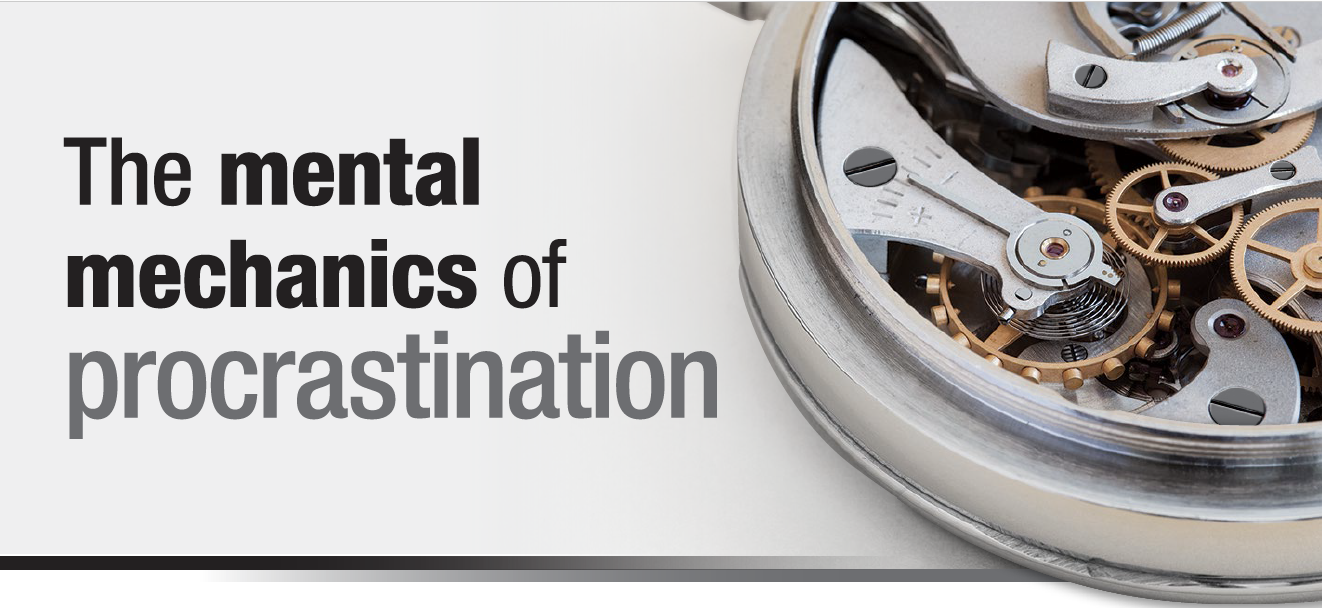
Even the most productive amongst us is prone to procrastination at times.
So, what can we do about it?
And how can we make sure it’s not getting in the way of us achieving our goals?
Understanding the mental mechanisms at play is a good place to start.
At the core of procrastination is impulsiveness. Those who tend to procrastinate often have difficulty in delaying gratification. What’s happening here is that two parts of the brain are working in opposition. The prefrontal cortex which controls your willpower is fighting a losing battle against your thalamus which thrives on the sensory pleasures of the here and now. (1)
How it manifests
Procrastination manifests differently in everyone but it usually entails putting off a boring, difficult or important task in favour of something easy or instantly gratifying. Some common symptoms include: random web browsing, social media scrolling, snacking, cleaning and TV binging. Less obvious, but just as prevalent, is the phenomenon of priority dilution where a frenzy of busyness can mask the fact that we are just avoiding harder tasks. (2)
Procrastination can also be a self perpetuating cycle. Some psychologists have labelled this the procrastination doom loop. (3) You begin procrastinating because you ‘don’t feel in the mood’ which then incurs feelings of guilt for not having got onto the job sooner. This guilt makes you feel worse, making you more likely to continue procrastinating.
So how do you fix it?
Before you put in place some strategies to combat procrastination, it’s good to reflect on why you do it in the first place. We all procrastinate for different reasons. Here are some of the most common:
• You feel like an imposter.
This is really a self-esteem issue. Many of us put off hard tasks because we don’t believe in our own abilities.
• You’re a perfectionist.
While perfectionists can often deliver incredible outcomes, they can also be unproductive, especially when their perfectionism is driven out of a fear of failure. The result can be wasting time on details and forgetting the big picture, or constantly missing deadlines because the product is ‘not ready’.
-
You love that last-minute thrill.
Like the kid in school that occasionally got A’s in spite of completing their homework on the bus, some of us get a thrill out of leaving tasks until the last minute, mistakenly believing that the quality doesn’t suffer.
Changing your habits
Once you’ve reflected on what sort of procrastinator you are, you can choose the tools that will best help you.
If you suffer from imposter syndrome, positive self-talk can help, using mantras to break the negative feedback loop.
For a perfectionist, sometimes fear of not doing something impeccably can stop you from starting at all. The task can just feel too big to overcome. If this sounds like you, break the project into smaller units and find a point of entry that is not too daunting.
For the thrill seekers, why not try a series of incremental deadlines? Remember self-imposed deadlines are more malleable than those set by others, so it may well be worth telling a friend or family member your goals so they can hold you accountable.
The other thing to remember is that your willpower can fatigue. Planning mindful breaks is important to allow your prefrontal cortex to recharge.
Keep it positive
Some tasks bring us more pleasure than others. We’re far less likely to procrastinate when we love what we’re doing. So, when thinking about your goals, make sure they line up with your passions .
And when you do find your mind wandering-or reaching for your phone at work-gently acknowledge what you’re doing then return your mind to the task. By recognising your triggers and knowing which tools work for you, you might just find yourself picking up speed and achieving more in your day.
- https://www.nationalgeograph.org/media/procrastination-and-brain/
- https://www.inc.com/jessica-stillman/is-priority-dilution-thenew-procrastination.html?cid=readmore
- https://www.theatlantic.com/business/archive/2014/08/the-procrastination-loop-and-how-to-break-it/379142/
